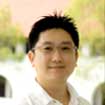
is an Associate Professor at the Faculty of Law, National University of Singapore (NUS) where he teaches corporate law and world trade law. He has a LLB (First Class Honors) from NUS and a LLM from Harvard. After graduation, he worked in the corporate department of Allen & Gledhill before returning to NUS, He, with some colleagues, started the first World Trade Law course at NUS and became involved in negotiations for Singapore’s early free trade agreements. He has been a consultant to the Singapore Ministry of Trade and Industry, Ministry of Foreign Affairs and Ministry of Finance as well as the World Bank and the WTO. Michael has also been involved in the building of trade law capacity of government officials in Asia and Latin America. On the corporate side, he has also assisted the Singapore Company Law Reform and Frameworks Committee which was tasked in 2001 with a major overhaul of corporate law in Singapore and in 2008 was appointed to a Working Group of the Steering Committee for the review of the Singapore Companies Act. Michael also volunteers with various local NGOs and co-founded aidha, an NGO which provides financial education and microfinance opportunities for domestic migrant workers and for which he was awarded a Social Entrepreneur of the Year Award in 2007. He was also awarded the Teaching Excellence Award in 2007 and the Inspiring Mentor Award in 2009.